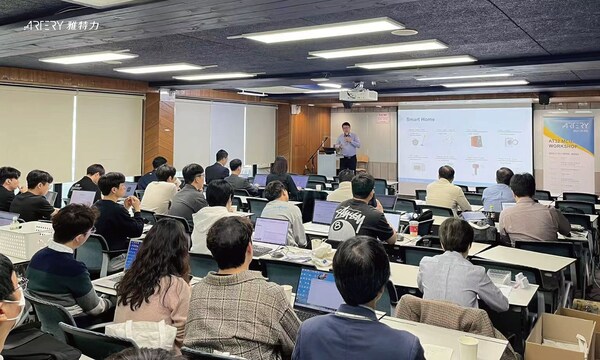TAIPEI, Nov. 4, 2024 /PRNewswire/ -- On November 1, 2024, ARTERY Technology, in partnership with its Korean distributor IGM, successfully hosted the "2024 AT32 MCU Application Training" in Seoul. The event focused on the latest AT32 MCU series and development tools, featuring hands-on sessions that allowed participants to experience the outstanding performance and versatile application potential of the AT32 MCU series.
ARTERY Technology is dedicated to advancing the 32-bit microcontroller market with its full range of AT32 MCUs, which are based on ARM® Cortex®-M4/M0+ architectures. These products have earned ISO 9001 quality management certification, AEC-Q100 automotive-grade reliability certification, and IEC 60730 home appliance functional safety certification. Known for high performance, precision, and stability, AT32 MCUs meet diverse market demands, covering a range of package sizes and various Flash and SRAM configurations. These MCUs are ideal for applications in industrial automation, IoT, smart homes, automotive, consumer electronics, and motor control. Since their debut in 2018, cumulative sales of AT32 MCUs have exceeded 100 million units, demonstrating their strong market presence.
During the event, participants had the opportunity to work with the AT-START-L021 development board based on the AT32L021 low-power microcontroller. Featuring the ARM® Cortex®-M0+ core with a frequency of up to 80 MHz, 64 KB of Flash, and 9 KB of SRAM, this low-power MCU also supports a wide range of peripherals, including CAN, USART, SPI, I²C, and a 12-bit ADC. Compatible with Arduino Uno R3 interfaces, the AT-START-L021 board also supports integrated development environments like Keil MDK, IAR EWARM, and AT32 IDE, providing engineers with a flexible and efficient platform for testing and development.
ARTERY also highlighted its latest motor-specific MCU series, the AT32M412/M416, built on the M4 core. With a frequency of up to 180 MHz, floating-point unit (FPU) support, four operational amplifiers in PGA mode, two comparators, and two ADCs (18 external channels in total), these MCUs offer advanced capabilities for motor control applications. For communication, the AT32M412 supports CAN bus, while the M416 series is upgraded to CAN-FD, meeting higher communication demands and providing robust support for various motor control needs.
The training session further explored BLDC and PMSM motor applications, focusing on FOC (Field-Oriented Control) technology in various sensor scenarios, including PMSM/BLDC FOC with Hall sensors, PMSM FOC with incremental encoders, and sensorless PMSM/BLDC FOC solutions.
ARTERY's motor development ecosystem includes the AT-MOTOR-EVB development board, motor libraries, and a variety of motor control solutions. Integrated with AT-Link or third-party debugging tools, the ecosystem supports brushless DC, synchronous AC, and asynchronous motors. Additionally, a free motor monitoring GUI displays real-time motor parameters, status, and response waveforms, enabling engineers to conduct online debugging and optimization. This efficient toolkit effectively reduces development cycles and accelerates product launches.
This collaborative training by ARTERY and IGM not only deepened technical exchanges but also introduced a broader range of solutions to the Korean market, empowering clients to tackle technical challenges and enhance competitiveness. Looking forward, ARTERY remains committed to driving innovation, expanding the application fields of AT32 MCUs, and delivering highly competitive embedded solutions to help industries worldwide achieve smart upgrades.






